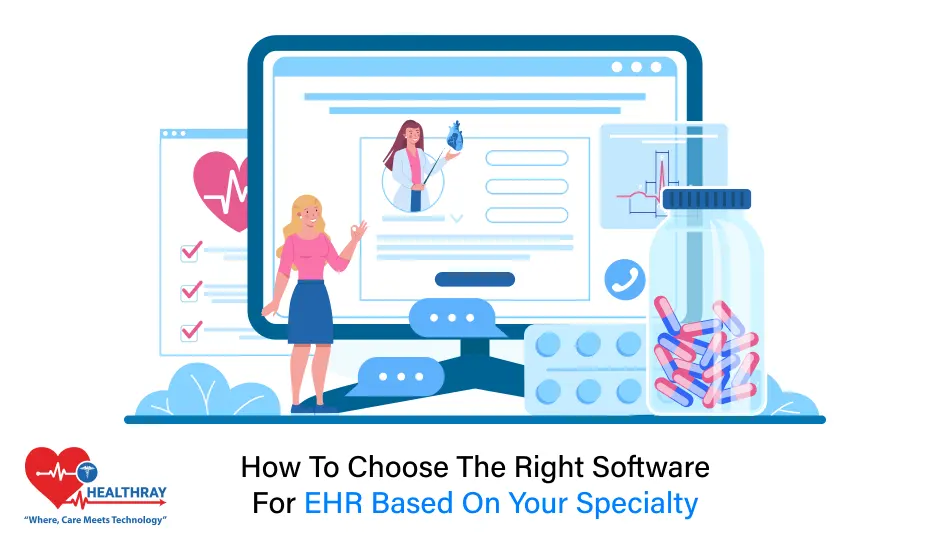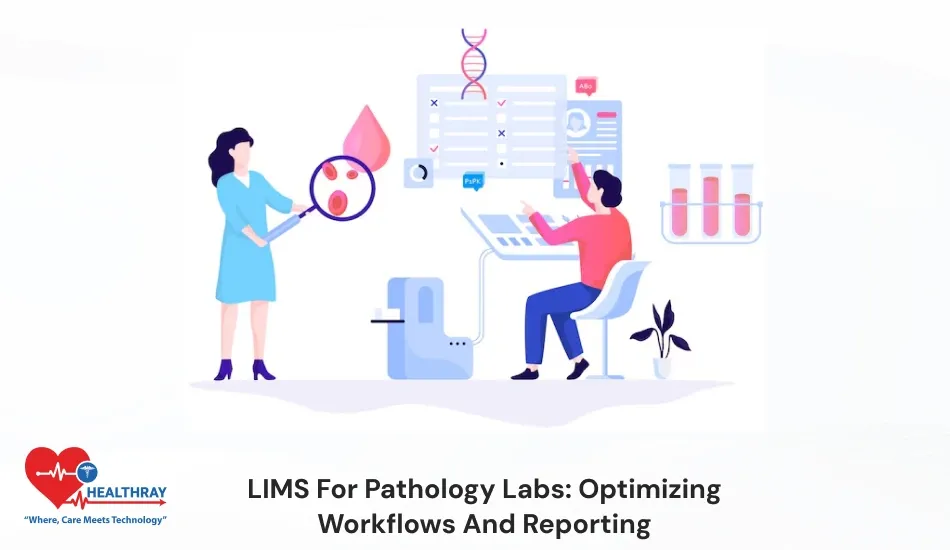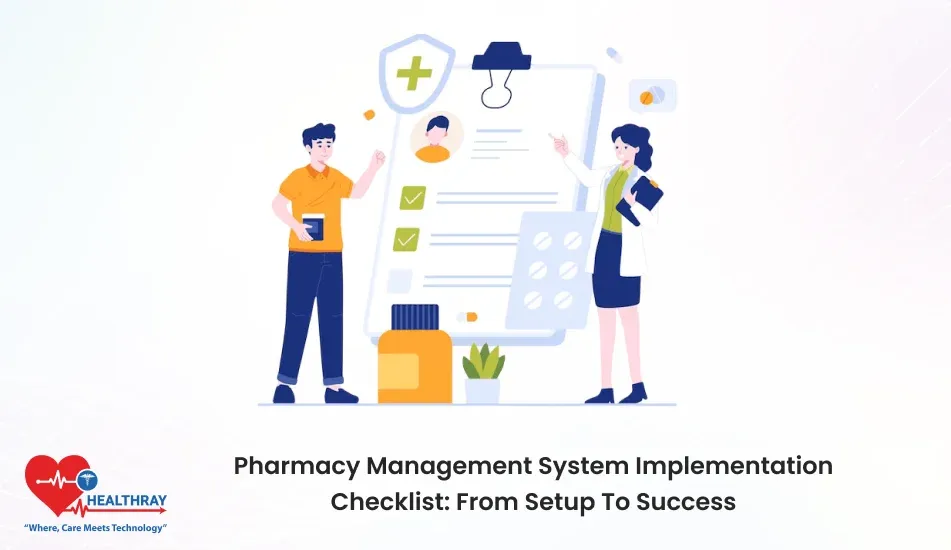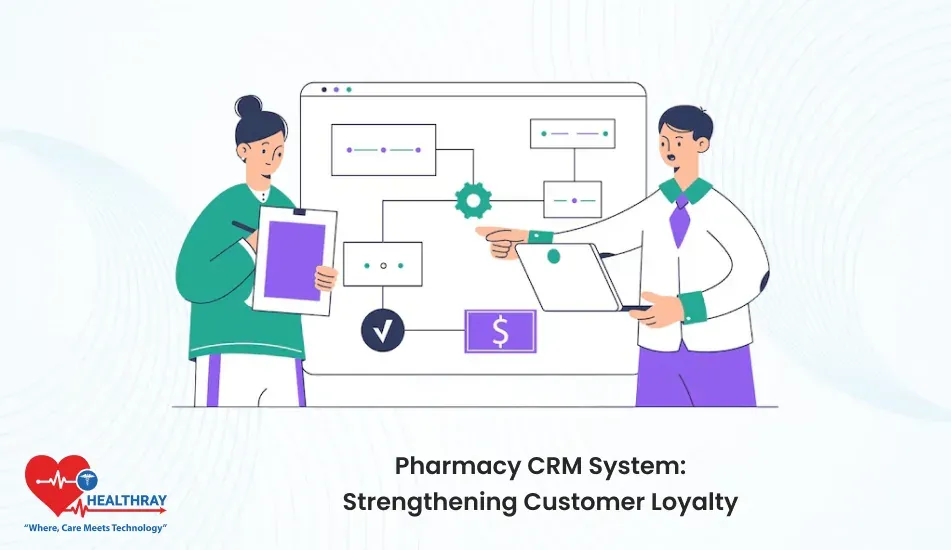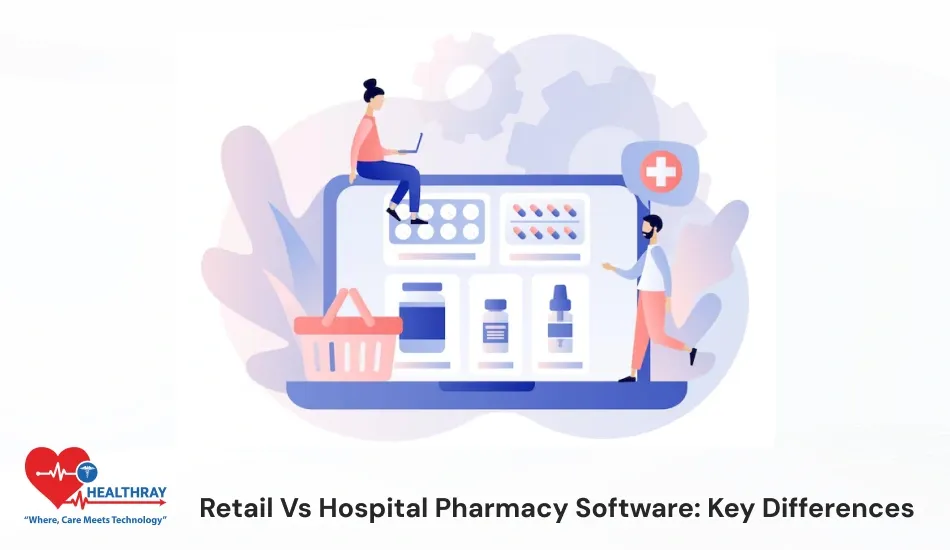Summary
The healthcare sector is becoming increasingly complex, making it more challenging to manage regulations, ensure interoperability, and optimize workflow. This blog aims to help doctors understand their specialty-specific needs. Also, I will discuss how to choose the right software for EHR to help you implement a system that truly grows with your clinical practices. Whether you are starting a new practice or just upgrading your existing system, if your EHR selection is thoughtful and strategy-based, then you will get better efficiency, compliance, and patient satisfaction in your system. Keep reading!!!!
Introduction
Choosing the right electronic health record is an important decision for healthcare practitioners. Furthermore, EHR is basically a shift from a paper-based system to a digital platform where all clinical and administrative data is stored in a safe and organized place. Nowadays, every specialty, such as pediatrics, cardiology, psychiatry, and OB/GYN, faces its own challenges.
That’s the reason one-size-fits-all EHR software is not suitable for every department. Every clinic should choose EHR software based on its workflow, documentation style, and future goals. EHR adoption has changed the entire system of healthcare industries. Furthermore, with EHR software, doctors can instantly access, update, and share patient data.
This improves patient outcomes while assisting physicians in making prompt, concrete decisions. Also, EHR software minimizes the stress of manual errors and paperwork and eases the communication between doctors and patients. Furthermore, EHR medical software not only stores patients’ records, but it also combines demographic info, diagnoses, medicines, lab reports, and radiology results, and provides a complete picture to the doctors.
Core Factors When Selecting EHR by Specialty
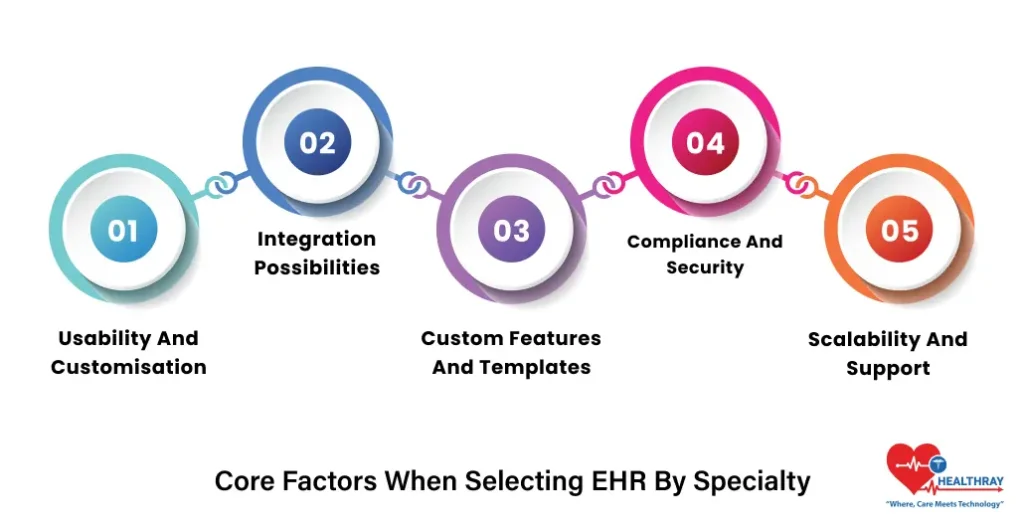
Let’s find out:
Usability and Customisation
In the old EHR system, doctors had to adjust their workflows according to the software. Thereby, it makes the entire workflow time-consuming and complicated. Furthermore, modern EHR has changed the entire outdated approaches of hospitals. With specialty-specific templates, customizable forms, and easy navigation, hospitals can make their documentation process smooth and simple.
Additionally, if you are a pediatrician, growth charts or vaccination templates are readily available in ehr system. Further, if you are a cardiologist, ECG reports and follow-up forms get automatically imported into the EHR system. Are you still using a rigid system that doesn’t align with your hospital workflows?? Now is the right time to upgrade the system.
Further, a user-friendly EHR not only reduces manual errors, but also it saves doctors’ time so that they can focus on patient care. Overall, an intuitive and customizable EHR makes your daily operations easy, fast, and stress-free.
Integration Possibilities
In a paper-based conventional framework, different processes, such as billing, lab reports, and scheduling, need manual intervention. Furthermore, the systems are commonly prone to data mismatch or errors. However, modern EHR has resolved the entire problem. Further, now all tools such as practice management, lab integrations, imaging centers, and telehealth platforms.
Further, if your EHR is properly integrated, then doctors can access the information in a single place. AI-based EHR software simplifies the hectic work of doctors and staff. Additionally, EHR software auto-updates the reports and directly synchronizes the billing process.
Thus, it eliminates the likelihood of double entries and manual errors. Are you struggling with managing multiple software and wasting time on combining data? Hospitals must now make the decision to use an integrated EHR platform. Overall, integration will make the entire workflow of hospitals fast, accurate, and efficient. Additionally, doctors can concentrate greatly on patient care rather than indulging in repetitive manual and cumbersome activities.
Custom Features and Templates
As we know, every specialty has its own unique needs. Further, the same-sized software will not fit all your departments. In the traditional EHR system, every department gets the same templates. Each physician must adapt to the workflows of their specialty. However, modern EHR systems have eliminated this limitation. Further, with the EHR medical solution, hospitals can customize their features and templates according to their medical practices.
Additionally, if you are a pediatrician, you will get growth charts, vaccination auto-reminders, and immunization coders. If you are a psychiatrist, then you can conveniently access patient confidentiality tools, therapy progress notes, and treatment planning modules. Are you still using generic templates that do not align with your patients needs? Then it’s the right time to shift to ehr that can adapt as per your specialty workflows. Overall, custom templates and features make the documentation fast, increase accuracy, and make the doctors’ work more organized and easier.
Compliance and Security
As we know, patient data is a valuable asset in the healthcare sector. Further, compromising data security is a serious risk for any medical organization. In the old healthcare system, limited security measures and manual record-keeping increased the risks of data breaches and compliance issues. However, modern EHR has mitigated these shortcomings.
Further, modern EHR software systems are based on HIPAA, HITECH, and state-specific mandates. Consequently, your system automatically follows regulation, whether it pertains to patient consent, access control, or encrypted data storage.
Further, if you’re using an outdated system where security is limited, it is highly imperative for the medical sector to upgrade. Moreover, a secure EHR saves your clinic from legal penalties and helps you establish a strong rapport with patients. Overall, a compliance-ready and secure EHR will keep your data and documentation safe and error-free. Also, it helps you to grow your practice confidently without stressing about confidentiality pitfalls.
Scalability and Support
Whether you are managing a large hospital or a small clinic, the primary goal of the medical industry is expansion. Further, it is difficult for the medical sector to expand with outdated software. As the patient count increases and services expand, outdated software becomes slow and creates performance issues. Modern EHR has completely eradicated this problem. Further, these systems are scalable; therefore, you can add or remove modules as per your specific needs.
Furthermore, whether you are managing a multispecialty hospital or a single-specialty clinic, the EHR implementation allows your system to readily adapt without experiencing downtime or data loss. Plus, reliable vendor support is also crucial when your system incurs a technical issue.
Fast response and expert guidance keep your workflows smooth. Are you ready for EHR future growth? It’s the right time to choose a scalable or support-driven EHR system. Overall, scalability and strong support keep your system future-ready. Moreover, smooth performance ensures efficient care delivery.
The EHR Selection Process: Step-by-Step
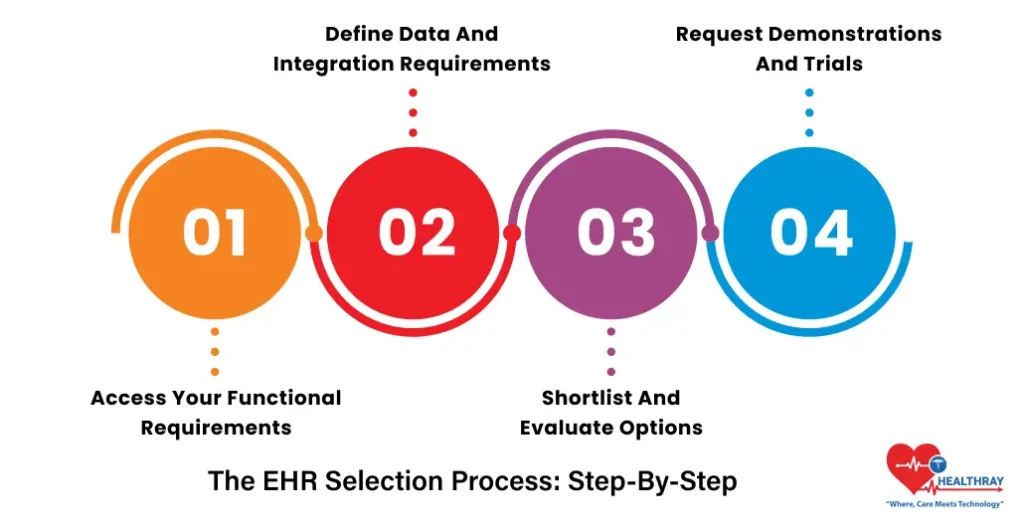
Let’s check out:
Access your functional requirements
Firstly, it is important for healthcare professionals to understand their operational needs. Furthermore, take feedback from doctors, nurses, and admin staff to help you identify the bottlenecks, such as workflow delays, documentation gaps, and growth challenges. Moreover, when all the stakeholders work on the same page, it is truly feasible for hospitals to make accurate and optimal decisions.
Define data and integration requirements
Next, prepare a list for all the data that you need to manage, such as specialty-specific tests, custom forms, and lab or hospital integrations. Further, this step ensures your EHR system gets perfectly connected, and data flow becomes quick and easy.
Shortlist and evaluate options
There are numerous EHRs available in the market; however, not every EHR will fit your specialty needs. Further, narrow down the list of EHR systems that are tested in your specialty. Also, don’t forget to check vendor reputation, technical support, and third-party integrations. Additionally, reviews, demos, and peer feedback provide you with practical insights to determine your workflow needs.
Request demonstrations and Trials
In this step, ask for demos and trials from your vendors. Further, involve your staff and test your real-life workflow scenarios, such as appointment booking, charting, and billing. Further, check whether the system is user-friendly or works smoothly in the customization process.
Conclusion
Choosing the right EHR is a strategic decision with a direct impact on clinical efficiency, compliance, and patient outcomes. By anchoring your decision-making process in your specialty’s specific requirements and leveraging a robust evaluation strategy, you can select an EHR that truly empowers your practice for long-term growth and excellence.
I hope the above blogs provide you with useful insights on EHR software and how it helps hospitals improve efficiency, compliance, and patient satisfaction in the system.
